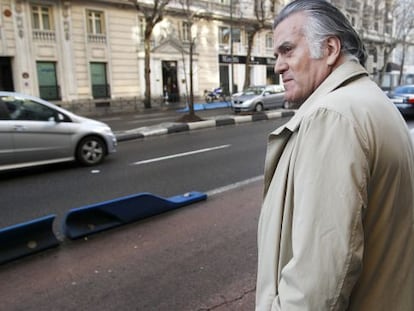Bárcenas never left PP payroll
Party was paying ex-treasurer compensation as well as covering social security costs
Since the scandal broke involving the earnings of Luis Bárcenas and the alleged slush fund he controlled, the Popular Party (PP) has insisted that it broke off relations with the former treasurer in 2009, when he stepped down from that role on a temporary basis. But it has emerged that not only did Bárcenas receive preferential treatment from the party until a month ago — with an office for his documents at the party’s headquarters in downtown Madrid, as well as a secretary in the same building, paid for by the PP — but that he also was being paid a monthly amount by the party until the end of 2012.
Besides continuing to pay him those funds, the Popular Party was also taking care of Bárcenas’ social security payments, according to an agreement reached between the former treasurer and the party leadership — a decision that could only have been given the go-ahead with the blessing of the prime minister and PP leader, Mariano Rajoy.
Secret ledgers published by EL PAÍS several weeks ago appear to show that Bárcenas was behind a slush fund at the PP, which saw thousands of euros paid out over a number of years to high-ranking members of the party, including Rajoy himself. What’s more, as part of an investigation into Bárcenas’ role in the Gürtel kickbacks-for-contracts scandal, it emerged recently that the former PP treasurer had up to 22 million euros deposited in a Swiss bank account.
In 2010, 18 months after Bárcenas’ alleged involvement in the Gürtel case emerged, he left the PP and his role as senator. He was left without a public salary, and requested he be readmitted to the PP as an employee, according to party sources. A compensation payout for his sacking from the PP was agreed, for an amount of at least 400,000 euros, according to the same sources. Bárcenas apparently requested that the funds be paid out to him on a month-to-month basis, with the payments due to end in December 2012, and the party also taking care of his social security payments.
The party agreed to these requests, meaning that he was directly linked to the party until just a couple of days before the reports of his Swiss bank accounts emerged, on January 16. For its part, the Popular Party maintains that the payments were simply a prorated compensation payout and that Bárcenas has not carried out any work for the party since 2010, when he negotiated his exit.
The ex-treasurer himself explained this situation last week to the anticorruption prosecutor, when he was called to make a statement in the investigation that was opened after EL PAÍS published the papers.
Bárcenas explained that he had left the party in 2010, but that the PP continued to pay him in 2011 and 2012 — albeit in private, and without informing anyone, as well as allowing him to continue to work in the party’s Madrid headquarters while in public trying to convey the impression that the PP had completely broken off its relations with him.
Handwriting analysis confirms Bárcenas as author of ledgers
A calligraphic analysis of the handwriting on the 14 pages of Luis Bárcenas’ secret ledgers, which was commissioned by EL PAÍS, has concluded that the author of those documents is indeed the ex-Popular Party treasurer. The report, the first carried out on the entirety of the material that is in the possession of EL PAÍS, has also found that the documents were not all created at the same time, but rather reflect progressive changes in the handwriting, which would correspond with the dates of the documents, ranging from 1990 to 2008.
A number of other media outlets — from radio station Cadena Ser to the daily El Mundo — have carried out similar tests using juts a small sample of the ledgers, and have all reached the same conclusion: the writing belongs to Bárcenas.
The documents in question reflect a slush fund managed by the former party treasurer, until he resigned after being implicated in the wide-ranging Gürtel kickbacks-for-contracts investigation. Indeed, many of the donations on the ledgers are from companies implicated in that scandal. Many of them were illegal due to the fact that they exceeded the legal limit for party donations. Also on the ledgers are payments made to victims of terrorist attacks as well as regular cash payments to party leaders, including Prime Minister Mariano Rajoy.
The PP has commissioned its own analysis of the documents, after a number of its leaders suggested that the pages were created by someone recently, and were based on some legitimate payments made by the party — such as a five-million-peseta loan made to the current Senate president, Pío García-Escudero — mixed with invented entries.
María del Rosario Casas Bartolomé, who has been a court-accredited calligraphy expert since 1997, says in her report for EL PAÍS that “the basic idiosyncratic characteristics of the texts [...] correspond with those to be found in documents whose author has been confirmed as being Luis Bárcenas Gutiérrez.” She adds that “we consider that all of the handwritten texts, which have been analyzed throughout, have been created by the same author.”








































